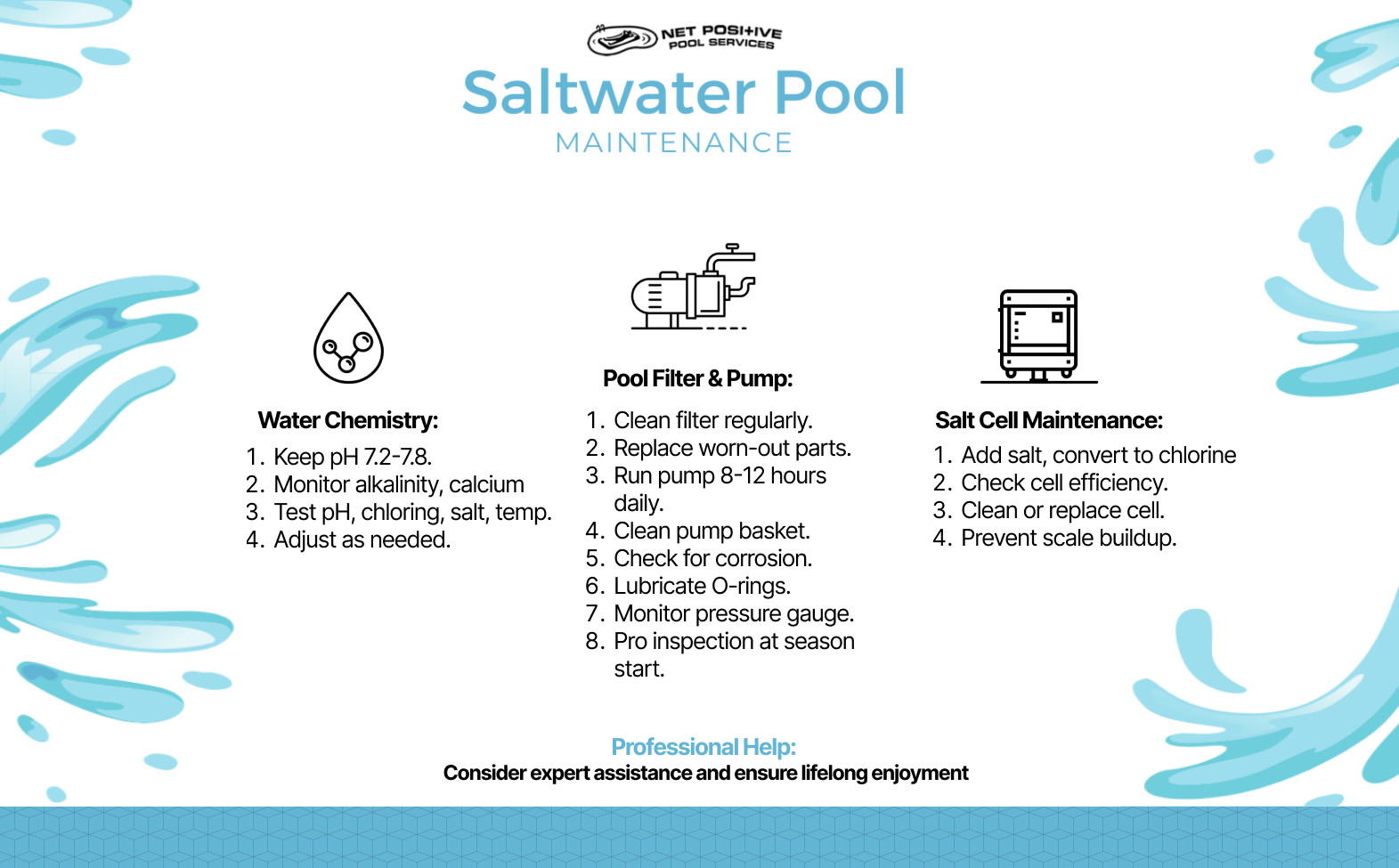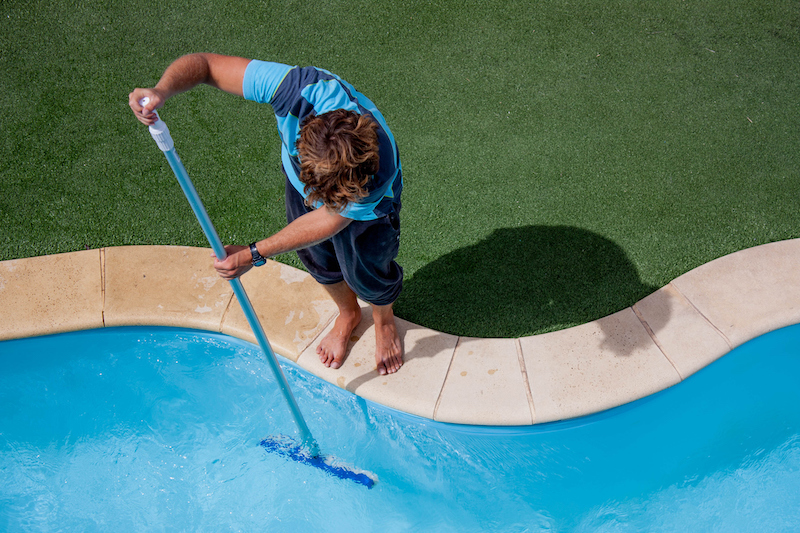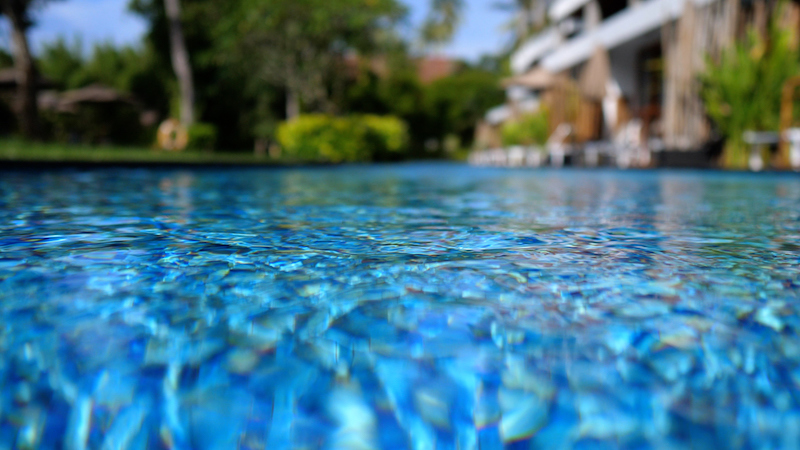Table of Contents
Owning a saltwater pool is often a dream come true for many pool owners. The gentle feel of the salt water on the skin and the lack of traditional chlorine make these pools an attractive option. But what does it take to maintain a saltwater pool properly? Let’s dive into the essentials.
Challenges of Saltwater Pool Maintenance
Saltwater pool maintenance is not as daunting as it might seem, but it does require attention to detail. Here’s what you need to know:
- Balancing Water Chemistry: The water chemistry of a saltwater pool is a delicate balance that must be maintained. This includes monitoring the pH level, chlorine level, and salt level. Any imbalance can lead to unpleasant water conditions and potentially harm the pool’s equipment. Keeping an eye on total alkalinity and calcium build-up is crucial.
- Regular Maintenance Needs: Saltwater pools require regular maintenance, much like traditional chlorine pools. However, they may encounter unique issues like calcium buildup and mineral deposits, which can affect the pool’s overall function and appearance. Maintenance help for salt and chlorine pools can be found here.
- Comparison with Traditional Chlorine Pools: While the maintenance of a saltwater pool has its specific challenges, it often requires less maintenance compared to a traditional chlorine pool. However, understanding the differences between the two can be key to maintaining your saltwater system effectively.

The Basics of Saltwater Pool Maintenance
Proper maintenance of a saltwater pool requires some essential tools and components. Here’s what you should know:
Pool Filter and Pool Pump
Maintaining the pool filter and pump in a saltwater pool is essential for ensuring the water’s cleanliness and the system’s longevity. The pool filter, whether it’s a sand, cartridge, or diatomaceous earth type, needs regular attention. Regular inspections and cleanings are crucial, with tasks varying based on the filter type. For instance, cartridge filters should be rinsed with a hose to remove debris, while sand filters may need periodic backwashing. Salt accumulation can also be an issue in saltwater pools, so it’s important to check the filter for excessive salt buildup. Over time, the filter medium will wear out, so be sure to consult the manufacturer’s guidelines and replace components as necessary.
The pool pump, another pivotal component, requires daily operation to ensure adequate water circulation. It’s recommended to run it between 8-12 hours daily. Cleaning the pump basket regularly is essential, as it can accumulate debris like leaves and bugs. Additionally, salt can be corrosive, so inspect the pump for signs of wear or corrosion. Using pumps designed for saltwater pools can help, as they typically feature corrosion-resistant materials. Periodic lubrication of the pump’s O-rings and gaskets can maintain a good seal, and it’s crucial to monitor the pump’s pressure gauge for indications of potential issues. For optimal health of your saltwater system, consider a professional pump inspection at the start of each swimming season.
Salt Chlorine Generator or Salt Cell
A saltwater pool is not devoid of chlorine. Instead of adding chlorine directly, pool owners add salt to the pool. The water, now saline, passes through the salt cell machine. This machine consists of titanium plates coated with a thin layer of a noble metal, such as ruthenium or iridium. As the saline water flows over these plates, a low-voltage electrical current is applied, initiating a process called electrolysis. During electrolysis, the salt (sodium chloride) is broken down into its basic components, and chlorine gas is produced. This chlorine gas immediately dissolves in the water, where it becomes hypochlorous acid and hypochlorite, the active sanitizing agents used in all types of pools to kill algae, bacteria, and other harmful organisms.
It’s essential to monitor and maintain the salt cell machine, as scale can build up on the titanium plates, reducing efficiency. Regularly inspecting, cleaning, and, if necessary, replacing the cell will ensure it continues to operate effectively. Read more about how Net Positive Pools can help maintain your salt cell system.
Testing & Balancing Water Chemistry
Regular testing will ensure that the pH levels remain balanced, generally between 7.2 and 7.8, to optimize the chlorine’s efficiency and comfort for swimmers. Alkalinity and calcium hardness should also be monitored to prevent scaling and ensure pool equipment protection. Using test strips, you can easily check the water temperature, pH level, chlorine level, and salt level. This allows you to make adjustments as needed to keep the water in perfect condition.
Understanding the nuances of saltwater pool maintenance is crucial for any pool owner. Whether you have a concrete pool, fiberglass pool, or vinyl pool, knowing what your saltwater system needs can ensure a lifetime of enjoyment. If you want the best for your pool, professional help might be the perfect solution.

Saltwater vs Chlorine
Pools Saltwater pools have become increasingly popular and for a good reason. While they still utilize chlorine to sanitize the pool water, the method of generating chlorine is different, and this distinction brings several advantages. Let’s compare saltwater pools with traditional chlorine pools to understand why many pool owners are making the switch.
Health and Comfort Benefits
- Skin and Eye Comfort: Saltwater pools are known for their gentle water, as they have lower chlorine levels. Unlike traditional chlorine pools, they cause less irritation to the eyes, skin, and hair.
- Reduced Chemical Smell: The notorious chlorine smell associated with traditional pools is less prevalent in saltwater systems, thanks to the continuous conversion of salt to chlorine.
- Fewer Harmful Byproducts: Saltwater chlorine generators produce chlorine on a regular basis, reducing the chance of harmful byproducts like chloramines.
Economic Benefits
- Lower Chlorine Costs: While there might be upfront costs for the salt chlorine generator, the ongoing cost of purchasing liquid chlorine or chlorine tablets for traditional pools is typically higher.
- Less Maintenance: Many pool owners find that saltwater pools require less maintenance compared to regular chlorine pools, especially when utilizing services like Net Positive Pool Services’ Weekly Pool Maintenance Program.
Environmental Benefits
- Reduced Chemical Usage: Saltwater pools require fewer added chemicals, aligning more closely with a sustainable and eco-friendly approach.
- Energy Efficiency: Modern salt chlorine generators are often more energy-efficient than traditional methods of chlorination.
Aesthetic and Experience Benefits
- Water Feel: Many swimmers prefer the softer feel of saltwater, likening it to a gentle saline solution rather than the sometimes harsh sensation of a traditional chlorine pool.
- Clearer Water: Saltwater systems often result in clearer water, enhancing the swimming experience.
Why Choose a Saltwater Pool?
The decision to choose a saltwater pool over a traditional chlorine pool comes down to personal preferences and needs. If the health benefits, economic savings, environmental considerations, and overall swimming experience resonate with you, a saltwater pool may be the ideal choice.
Regular Pool System Maintenance is Crucial
Having a saltwater pool is a significant investment, and regular basis maintenance ensures that your investment stays in optimal condition. Here’s why it matters:
- Longevity: Proper care and regular checks of essential components like the pool filter, salt cell, and pool pump can extend the life of your saltwater system.
- Safety: Ensuring that the water chemistry, including the hypochlorous acid level, is within safe parameters keeps the pool water protected from hazardous germs. As per the CDC recommendations, testing the water chemistry is extremely important in killing germs such as E. coli and keeping swimmers safe.
- Aesthetic Appeal: Regular maintenance helps prevent calcium buildup, mineral deposits, and other issues that could impair the pool’s appearance.
- Cost-Efficiency: Preventive care by professionals can save you from costly repairs or replacements in the future.
Hiring Professional Pool Services
Maintaining a saltwater pool can be a fulfilling experience, but it can also become overwhelming at times. This is where professional assistance comes into play. Why should you consider hiring professionals for your saltwater pool maintenance? Let’s explore the reasons.
- Expertise and Experience: Professionals at Net Positive Pool Services have years of experience in saltwater pool maintenance. From balancing water chemistry to handling salt systems and saltwater generators, they know the ins and outs of what your pool needs. They can even provide insights into less maintenance-intensive solutions.
- Time-Saving and Convenience: Managing the pool’s pH level, chlorine level, salt level, and water temperature takes time and effort. Professional pool maintenance services can take this burden off your hands, allowing you to enjoy your pool without the stress of regular maintenance.
- Net Positive Pool Services’ Weekly Pool Maintenance Program: Net Positive Pool Services offers two weekly programs: full-service and chemical-only options. These programs are designed to meet the unique requirements of saltwater pool owners, ensuring that everything from salt chlorine generator checks to muriatic acid adjustments are handled with expertise.

Your Go-To Pool Service Provider
Taking care of a saltwater pool is made easier with Net Positive Pool Services because you have a partner who understands the intricacies and is equipped to handle them. Here’s why we stand out as the preferred choice for saltwater pool maintenance:
Specialized Expertise in Saltwater Systems
Navigating the complexities of saltwater pools requires dedicated expertise. At Net Positive Pools, we master the nuances of saltwater chemistry, ensuring the right balance of salt, pH, and chlorine levels. Our adept team not only ensures the longevity of your salt chlorine generator but also promptly addresses unique challenges like calcium buildup and mineral deposits that are inherent to saltwater systems.
Our Weekly Pool Maintenance Program
Maintaining a saltwater pool’s pristine quality demands a consistent and knowledgeable approach. Our Full-Service Option encompasses everything from debris cleaning to chemical balance, providing an always-ready pool experience. Alternatively, for those who manage their own cleaning but seek precision in chemical balance, our Chemical-Only Option is tailored to expertly adjust and maintain the ideal salt and chlorine levels
Serving Saltwater & Chlorine Pools
At Net Positive Pools, we pride ourselves on delivering comprehensive services tailored to the distinct needs of both saltwater and chlorine pool owners. Our deep understanding of the intricacies of each system enables us to provide specialized maintenance, troubleshooting, and guidance for every pool type.
Transitions, Remodeling, and Enhancements
Considering a switch from a chlorine-based system to a saltwater one? Our experts ensure a smooth process, coupled with a thorough cost-benefit analysis to aid your decision-making. Whether it’s a complete pool makeover or adding the latest enhancements and accessories, we’re dedicated to elevating every aspect of your pool experience.
Simplify Your Pool Experience
With locations across Huntersville, NC; Greenville, SC; Charleston, SC; Statesville, NC; and York County, SC, we are conveniently positioned to serve you and your family. Our commitment to quality and client satisfaction sets us apart.
Contact Net Positive Pool Services today to discover how we can simplify your pool ownership. From saltwater system guidance to complete pool makeovers, we are ready to make your pool experience Net Positive.


